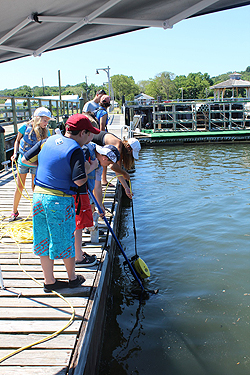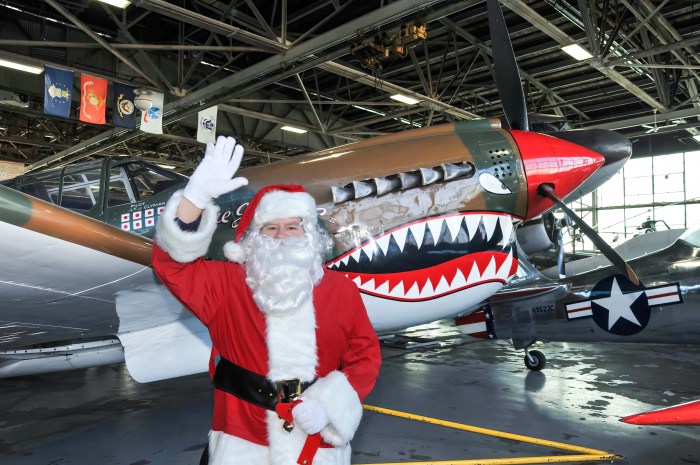The Rozalia project came to the WaterFront Center for two days, June 30 and July 1, on their mission to help clean the world’s waterways, oceans, and all bodies of water it can reach.
They were there to share with kids in the WFC summer programs to help educate people about how they can protect and preserve our oceans and other bodies of water.
They were dockside with their ROV (remotely operated vehicle), exploring the harbor’s floor at the WaterFront Center.
“There were 136 sailors of all ages from the WaterFront Center learning about the project. They and the Rozalia Project crew found 41 pieces of trash over the two days,” said Sloane Suciu, who was working with Rachael Miller on the Rozalia Project this summer.
“The commercial oyster dredges keep the harbor floor clean of marine debris,” said Ms. Suciu. Rozalia Project was founded by Rachael Z. Miller and James Lyne in 2010. Rozalia Project is a 501(c)(3) nonprofit that specializes in underwater clean up, using a remotely operated vehicle equipped with video, manipulator arms, positioning system and imaging sonar that can locate and pick up debris and bring it back to the surface. Rozalia Project also utilizes a side scan sonar to survey whole areas in order to pinpoint locations to launch the ROVs and pick up the debris.
Rozalia Project’s mothership is the round the world voyager, American Promise. This 60 ft. sailboat was built for ocean voyages and is the perfect vehicle for marine debris removal and research.
Oyster Bay Debris
Here is the breakdown of what they found in Oyster Bay:
- 18 miscellaneous plastic (plastic pieces unidentifiable, but roughly the size of a quarter or smaller).
- 12 cans.
- 5 plastic water bottles.
- 3 glass pieces.
- 4 styrofoam pieces.
Ms. Suciu said, “Luckily, the current does allow the surface and the floor area that we monitored in Oyster Bay to remain relatively clean.”

Add to that fact that the Friends of the Bay have been holding annual beach cleanup days with the help of the North Oyster Bay Baymen’s Association and the Town of Oyster Bay for many years. Included in the volunteers at that annual event are the crew from the Atlantic Steamer Dive Team who always search the local waters for underwater debris.
All in all, Oyster Bay is a clean harbor. Local residents can recall when the beaches were a beachcomber’s heaven. Today the pickings are slim.
Trash Tour 2011
The Rozalia Project’s Trash Tour 2011, phase one, onboard the sailing research vessel American Promise, was focused on marine debris removal and education. Here are some highlights and statistics from the Trash Tour to date:
- 2,525 pieces of trash were removed from the surface to the sea floor using an ROV(remotely operated vehicle), sidescan and imaging sonar + nets.
- 1,047 people participated in Rozalia Project’s programs.
- 32,877 Facebook views.
- 479 miles sailed.
- 380´ of rope recovered.
- 8 derelict lobster traps removed.
- 5 state-of-the-art systems were used to find and recover marine debris from the sea floor: VideoRay ROV, Blueview imaging sonar, Tritech Starfish side scan sonar, Lyyn image enhancement and KCF Smart Tether positioning system.
- 2 Newfoundland dogs became sailors.
- 1 historic Herreshoff fisherman anchor recovered.
In Boston, MA: The Rozalia Project crew worked with over 407 participants from Courageous Sailing and Boston Community Boating to recover more than 1,758 pieces of trash from Boston Harbor and the Charles River. Boston harbor with strong SW winds brought continuous floating marine debris past American Promise at Courageous Sailing’s dock . The ROV found reefs of beverage cans and plastic cups on the sea and river floor. The large volume of microplastics was a surprise (as they are usually associated with ocean gyres) and Rozalia Project is very excited about this discovery and future plans in Massachusetts Bay.
In Newport, RI: Hosted by Sail Newport, Rozalia Project and 212 junior sailors made a dent in the beer can mountain under the docks, recovered 8 derelict lobster traps and made a discovery… these traps have been acting as passive trash collectors. Every trap contained an array of cans, bottles, plastic, boat parts and even a golf ball.
In Providence, RI: Rozalia Project teamed up with Providence Community Boating to provide a STEM (Science, Technology, Engineering and Math) program for 127 kids from a Providence summer school program. For many of these kids, ages 11-14, this was their first meaningful interaction with the river and their first opportunity to see underwater, co-pilot an ROV and read an underwater sonar while learning about the effects of trash in the water and doing something about it: they helped remove 166 pieces of trash from the Providence River.
In Oyster Bay: 136 sailors of all ages from The WaterFront Center and Rozalia Project crew found 41 pieces of trash over 2 days. The commercial oyster dredges keep the harbor floor clean of marine debris.
In Jamestown: 60 junior sailors at Conanicut Yacht Club cleaned up 16 pieces of marine debris off the seafloor.
In Bristol, RI: Rozalia Project’s crew recovered an historic anchor that is now part of a display in the Herreshoff Museum.
In Clark’s Cove just east of New Bedford: Rozalia Project and 45 junior sailors from New Bedford Community Boating found one plastic bag . Clarks Cove is a superfund site, yet one of the cleanest in terms of marine debris.
The second phase of the Rozalia Project Trash Tour 2011 is focused on marine debris removal and research and begins August 2 in Portsmouth, NH, surveying the Isle of Shoals looking for accumulations of derelict fishing gear for the Blue Ocean Society.
For information about the WaterFront Center programs please call 922-SAIL.































